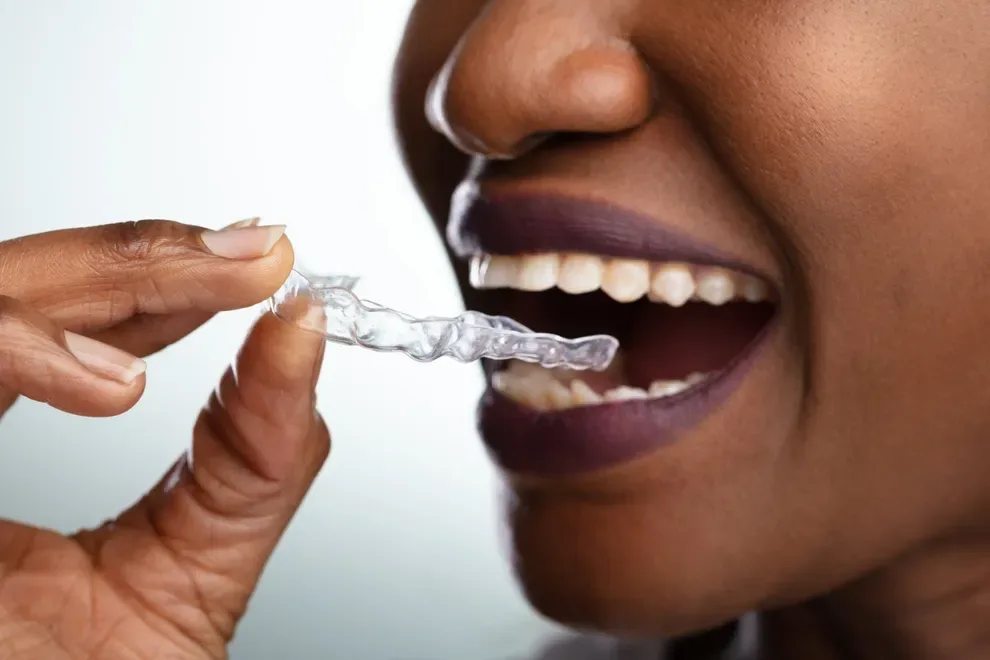Will My Aligner Cause Dry Mouth?

Table of Contents
- Causes of Aligner Dry Mouth?
- How Cleaning Prevents Dry Mouth
- Do Aligners Cause Bad Breath?
- Is a Dry Mouth Dangerous?
- How to Avoid Dry Mouth and Bad Breath
- Frequently Asked Questions
Aligners are a potential cause of dry mouth. That’s because they are foreign objects that can irritate gums and cause swelling. Your mouth may produce less saliva as a result, causing dry mouth.
There are simple steps you can take to reduce dry mouth when using clear aligners, such as drinking more water, boosting your oral hygiene routine, and limiting caffeine intake.
What causes aligner dry mouth?
Dry mouth (also known as xerostomia) stems from a low supply of saliva. Since saliva functions to keep the mouth wet as it fights off bacteria, a lack of saliva leads to overall dryness. It also makes gum disease and tooth decay more likely because saliva acts as a natural cleanser in the mouth.
Aligners serve as a plastic cap between your teeth and the air. They can also block small parts of gum tissue between your teeth. Your body may feel like your mouth is too moist, as your saliva doesn’t evaporate. As a result, your body may produce less of it. The result can be a feeling of dryness, especially when you take your aligners out to clean them.
Because aligner trays cover teeth for up to 22 hours a day or more, oral care specialists advise that you remain vigilant about improving your oral hygiene routine.
How cleaning can help prevent dry mouth with aligners
Improved oral care can lessen the likelihood of complications like cavities, bad breath, yeast infections, and chewing and swallowing problems caused by dry mouth. Here’s what you need to know.
Your aligners should sit in their case while you’re eating and drinking. Food and drink can stain your clear trays, and they can also trap food and keep it in close contact with your teeth. Cavities can quickly form.
Before you put your aligners back in your mouth, rinse them with lukewarm water. That step can also keep them cleaner before you put them in contact with your teeth.
At least twice per day, brush your teeth with a soft-bristled brush and toothpaste with fluoride. Use a gentle grip and brush every surface of your teeth, including both the front and the back. Follow that brushing with a thorough flossing, and rinse with water to remove the particles you release.
At least twice daily, brush your trays with a soft-bristle brush and nonabrasive toothpaste. Don’t scrub them with too much force, as they will bend or break. Just ensure that you run the bristles across every edge of the trays to remove all debris.
Is a dry mouth dangerous?
A long-lasting dry mouth can increase your risk of tooth decay. The National Institute of Dental and Craniofacial Research explains that saliva washes food from the teeth, and it contains minerals that help to keep teeth strong and fight tooth decay.
Persistent dry mouth can also make eating difficult. Without saliva, food can’t break down as you chew. If you swallow dry bites, you could also experience choking or gagging.
Common signs of dry mouth include the following:
A sticky feeling
Trouble chewing or swallowing
Burning sensations in your mouth
Cracked lips or tongue
Mouth sores
Oral infections
Your dentist may notice your dry mouth during your appointment, or you may have unusual cavities or infections that your dentist must treat.
How to avoid aligner dry mouth and bad breath
Keeping your mouth and aligners clean is critical. Other at-home steps may help too.
The National Institute of Dental and Craniofacial Research recommends these steps:
Drink 64 to 96 ounces of water per day. Think of this as 8 to 12 glasses of water.
Avoid caffeinated and carbonated substances.
Skip alcohol or tobacco, as they can dry out your mouth.
Run a humidifier in your bedroom at night.
Which option works best for you depends on your personality and habits. For example, if you sleep with your mouth open, a humidifier may be the best step. However, if you smoke, quitting could be the best idea.
Do aligners cause bad breath?
You need to wear aligners most of the day — about 22 hours — for them to effectively move your teeth. Covering your teeth with plastic for extended hours provides a conducive environment for bacteria accumulation. This accumulation could lead to bad breath if you don’t practice good oral hygiene.
The good news is you can reduce the likelihood of bad breath related to aligner wear if you simply brush and floss after every meal. Also, make sure to change your aligner trays out on the recommended schedule. Wearing them for longer than recommended increases the likelihood of bad breath.
FAQs
Aligners can lead to dry mouth because they may create gum irritation and swelling in some instances. Your mouth will produce less saliva to minimize the reaction, resulting in dry mouth.
When you first receive your aligner, your mouth will treat it as a foreign object and produce less saliva. Less saliva makes your mouth feel dry, and this translates to greater thirst. It’s common to feel thirstier when you wear aligners regularly, so combat the issue by drinking plenty of water and sucking on ice chips.
